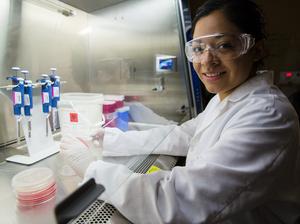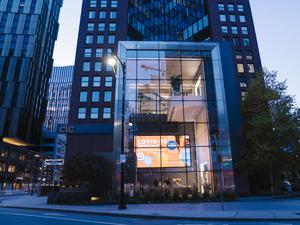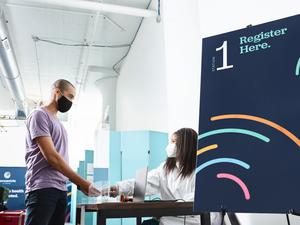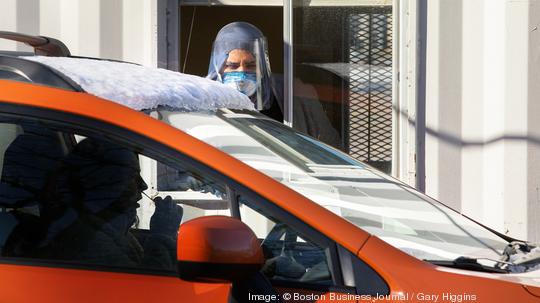
In 2020, picking just a handful of stories that defined the year was an especially difficult task. This year has rocked our global health systems, reawakened America to the reality of its centuries-old racial tensions, ravaged entire economic sectors and further enmeshed technology into our everyday lives.
It has also provided unprecedented opportunities for innovation. At BostInno, we've written that no one pivots like an entrepreneur, and we believe the stories we've covered over the past 12 months make that clear. However, in highlighting these pieces, we want to note that it can be terrible to have to rise to the occasion.
It is astounding that local startups were able to prop up new Covid-19 testing sites, for example. But for many entrepreneurs, it is also enraging that 10 months into the pandemic, the U.S. still lags in public, widely available testing. Ginkgo Bioworks CEO Jason Kelly called out public officials' lack of response when he contrasted it with university testing models: "They have set an example for the country, in my opinion," he said earlier this month. "Why aren't we doing that in Boston? Why aren't we doing that for everyone? We would be done."
Similarly, it is worth celebrating that business leaders and venture capitalists are more closely examining the diversity of their companies and portfolios. But as many startup leaders have pointed out, it is devastating that unbelievable sacrifice was apparently required for that to take place. The deaths of George Floyd, Breonna Taylor, Ahmaud Arbery and so many other Black Americans are not just a catalyst for change; they are also cause for immense grief.
Kristina Liburd, a local CEO and attorney who launched the Black Startup Collective this summer, put it succinctly: “It’s progress, but then you wonder, where was that energy before?” she told BostInno in June. “This is a visceral reaction to a very graphic death, which has been seen by so many people, during a pandemic. Why did it have to take this much? But we got here, so let’s make the best of it.”
With that in mind, let's take a look back at the top stories of 2020.
At least 30 local startups and tech firms laid off workers as a direct result of the pandemic — but some bounced back.
Starting in March and extending through the fall, more than two dozen companies across Boston's tech industry made cuts to their workforces, some of them drastic. During one particularly bad week in April, two unicorns, Toast and ezCater, laid off almost 2,000 workers in a 24-hour period. Both companies were hard-hit due to the industries they served. "There is not enough sugar on the planet to sugarcoat this: we’re a company that feeds meetings, and meetings are not happening much right now,” said one ezCater spokesperson.
Yet some companies were able to make a comeback. Spyce rehired three of those four employees in time to reopen its doors in November, when it unveiled a brand-new robotic kitchen. DataRobot, another unicorn that cut an unknown portion of its workforce, went on to raise $320 million in a two-tranche Series F round and is now valued at $2.8 billion, calling into question whether it needed to make layoffs at all.
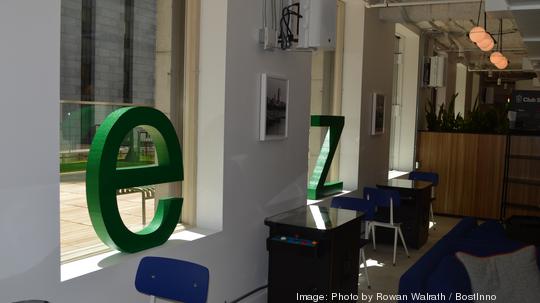
Startups pivoted to address the pandemic head-on.
In the early days of the pandemic, when hospitals were slammed by a shortage of personal protective equipment (PPE) and Covid-19 testing centers could not procure sufficient swabs, startups with manufacturing capabilities stepped up to fill the gap. 3D greeting card maker Lovepop began laser-cutting clinical-grade face shields in partnership with Partners Healthcare Working Groups and the State of Massachusetts Manufacturing Emergency Response Team. 3D-printing startup Formlabs launched the "Formlabs Support Network for Covid-19 Response," allowing anyone with a 3D printer to manufacture swabs, adjustment straps for facial shields and respiratory mask adapters for hospital systems and government agencies. Markforged and Desktop Metal 3D printed nasal swabs as well.
Meanwhile, elsewhere in Boston, startups and related organizations launched pandemic-specific initiatives in their own areas of expertise. Ginkgo Bioworks, the Cambridge Innovation Center and Brio Systems all began propping up Covid-19 testing sites. Somerville wastewater epidemiology startup Biobot Analytics used its technology to track the prevalence of SARS-CoV-2 in specific communities, working with hundreds of facilities across the U.S. by summer's end. GreenLight Biosciences began work on a platform to scale the production of mRNA vaccines, while Moderna famously developed a working Covid-19 vaccine that is now being administered under emergency use authorization.
"When we started this, we reached out to a bunch of our former classmates and connections who are working on the front line," Lovepop CEO Wombi Rose told BostInno in April. "Just hearing their stories about the lack of equipment and generally what their days are looking like right now, it's impossible not to do whatever you can to help them out. We're a company that has access to significant production resources. It just is something that you have to do."
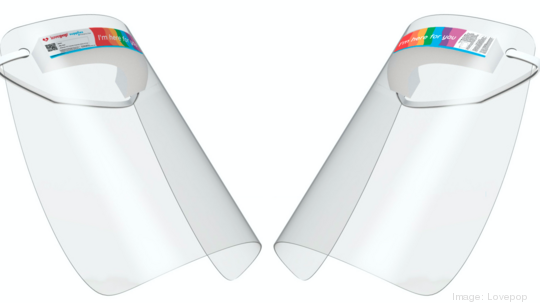
Mass. politicians cracked down on surveillance tech.
In June, Boston became the sixth Massachusetts city to ban the use of facial recognition technology by municipal authorities, following the leads of Cambridge, Somerville, Brookline, Northampton and Springfield. The city-level bans are all backed by the ACLU of Massachusetts’ “Press Pause on Face Surveillance” campaign, which has been working since June 2019 to pass municipal prohibitions on the government’s use of the technology and pass a statewide moratorium on the same.
The statewide moratorium has stalled on Beacon Hill despite widespread report. However, spurred by a renewed interest in police reform after the deaths of George Floyd and other Black Americans, Massachusetts lawmakers included a ban on police use of facial recognition technology in a bill on statewide police reform this fall. After passing in both the House and the Senate, the bill found an obstacle in Gov. Charlie Baker, who opposes the ban.
Entrepreneurs of color launched new diversity initiatives.
The lack of diversity in the tech and startup scene, particularly in Boston, is something entrepreneurs and leaders of color have been working to fix for years. This summer, several Boston-area entrepreneurs took something decidedly horrific — violence against Black Americans at the hands of carceral, economic and health systems — and seized on the chance to make things better.
CEO and attorney Kristina Liburd was one of them. In June, she launched the Black Startup Collective, which quickly grew from a humble Typeform to a vast directory of Black-owned startups, with links to partners, resources and other lists, including a list of venture capital firms that invest in Black-led startups. Another was Pariss Chandler, CEO and founder of Black Tech Pipeline, a newsletter and job resource platform whose comprehensive new site went live in September. And Drafted, the Boston startup focused on hiring and referrals, revamped an accountability tool called DiversityReports.org targeting diversity in the tech industry.
“It’s progress, but then you wonder, where was that energy before?” Liburd told BostInno in June. “This is a visceral reaction to a very graphic death, which has been seen by so many people, during a pandemic. Why did it have to take this much? But we got here, so let’s make the best of it.”

Startup accelerators adapted to remote systems, and some of them may never go fully back.
The March scramble to get everyone working remotely hit accelerators especially hard. Matt Segneri, the new executive director of the Harvard i-lab, was in his new role for less than a week when Harvard sent its students home and the i-lab with it. He has maintained that "the community transcends the campus," but for a program that relies in part on serendipitous connections to get startups off the ground, replicating that community online has proved difficult. The same held true for MassChallenge, Techstars Boston and cleantech incubator Greentown Labs, which is home to multiple accelerators.
"One-to-one and advisory board meetings are now fully remote," Clement Cazalot, Techstars Boston's managing director, told BostInno in April. "The bulk of the programming, founder dinners and KPI meetings — all that is fully on Zoom. We live and die by Zoom."
Eight months later, Cazalot has transitioned his program only partially back offline. Techstars Boston moved to coworking space Venture Lane this fall and welcomed a new cohort. Teams are operating on a kind of hybrid model: The accelerator is remote-first, but entrepreneurs can come in as needed, as long as they comply with Venture Lane's safety policies. Venture Lane founder Christian Magel sees that as his company's future. In his vision, startups have just 20 percent of their teams working out of the physical space at any given time.

VC funding in startups with female founders fell.
In 2020, venture capital funding in women-founded startups declined for the first time in more than a decade, according to data from PitchBook. The first three quarters of the year saw startups with at least one woman on their founding team raise a collective $13.8 billion in VC funding — a 31 percent decline from the same period in 2019.
The drop comes as Covid-19 has taken a special toll on female founders and executives. A separate report from businesswomen network Chief examining the impact of the pandemic on executive women found that they are shouldering more responsibility at work regardless of their personal situation, and they face an unstated expectation that they should better be able to manage parents and caregivers on their teams because of their gender.
Plenty of female founders have had to scale back their 2020 plans, according to PitchBook. But Boston-area investors and founders note that founders aren’t the source of the problem. The dip is also fueled by investors, whose checks have gone to a smaller portion of female-founded startups than in years past.
“This isn’t a pipeline problem,” said Sarah Hodges, a partner at Pillar VC. “If we want to solve this problem, we as investors have to commit to building diverse networks, opening access to capable founders who are being overlooked today.”

